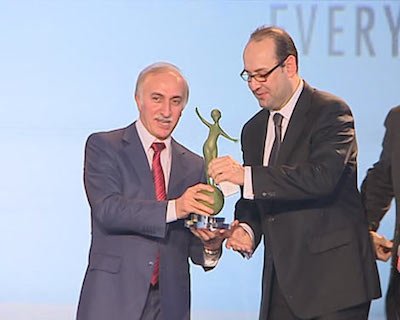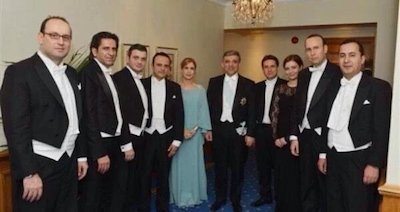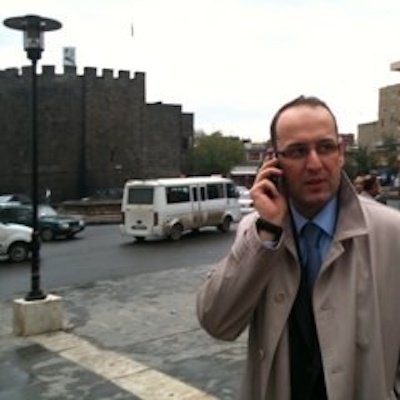Ali Ahmet Böken (46) is a successful journalist (broadcaster) who graduated from Ankara University’s Faculty of Communication in 1994. He worked as a journalist, a news presenter, an editor and a news director for Samanyolu Television. He was a columnist in samanyoluhaber.com, which is related to Samanyolu Haber TV. With the establishment of the Samanyolu Haber (News) TV on January 22, 2007, he became the chief editor of the channel.
He left the channel he was working for and transferred to the public broadcaster TRT as contracted personnel. He became the chief editor for TRT Haber (News), which was established on March 18, 2010. He gave lectures at Zirve University as a visiting academic about Public Broadcasting. He is married and has two children.

Ahmet Böken was a juror for Emmy Awards of International Academy of Television Arts and Sciences. Kerem Çatay, owner of the “Ay Production, was in the jury judging Drama Series and Ahmet Böken was in the jury judging News for the Emmy’s 41st Awards.
Böken was suspended and assigned to an ineffective post in strategy department after the corruption investigation of December 17-25, 2013 which implicated then-Prime Minister Recep Tayyip Erdoğan, his family members and his cabinet ministers. Following the controversial coup attempt on July 15, 2016, he was detained on August 11, 2016.

Because of an account at Bank Asya and the affiliation of the media companies, where he used to work, with Gülen movement were presented as the evidence in the case of the accomplished journalist. During the last hearing on January 23, 2018 at the Ankara 18th High Criminal Court, Prosecutor Necati Kayaközü requested 15 years of imprisonment for Böken. The evidence presented to the court are a book of a bank account, insurance documents from previous work places and witness statements.
There are many absurdities in the indictment, especially witness statements. For instance, the date of the crime has been showed as July 18, 2016, which is three days after the coup attempt. As in other indictments, the prosecutor has been trying to explain that Gülen movement is a criminal organization.

FETÖ is a pejorative acronym that Turkey’s political Islamist government and Turkish autocratic President Recep Tayyip Erdoğan have been using to defame the civic Gülen movement.
Böken’s children’s going to a school that was allegedly linked to the Gülen movement, and that school was closed by a government decree under the rule of emergency declared in the aftermath of the controversial coup attempt on July 15, 2016, was considered a criminal offence.

The testimony of the witness, named Tahsin Yıldız, shows sending TRT personnel abroad for education was listed among the criminal offences of Böken. However, as Böken stated in his defence, these policies were in the authority of educational department and the board of management of the TRT.
The TRT’s Board of Management consists of seven members, five of which have been directly appointed by the Cabinet. The other two members are deputies elected by the General Manager. Yıldız claims that “The average cost of sending a staff abroad is nearly a trillion Turkish Liras” let alone this claim was not supported by a document, it is not logical for a staff member to spend such an amount of money.

Böken definitely denied the claims that he used ByLock. His lawyers stated that search, confiscation and copying of digital materials did not comply with the law, indicating that; those added to the file are unlawful evidence.
Turkish authorities believe that ByLock is a communication tool among the alleged followers of the Gülen movement. Tens of thousands of people, including civil servants, police officers, soldiers, businessmen and even housewives, have either been dismissed or arrested for using ByLock since the failed coup attempt on July 15, 2016.
Turkey is the biggest jailer of journalists in the world. The most recent figures documented by the SCF has showed that 245 journalists and media workers are in jails as of January 24, 2018, most in pre-trial detention languishing in notorious Turkish prisons without even a conviction. Of those in Turkish prisons, 218 are arrested pending trial, only 27 journalists remain convicted and serving time in Turkish prisons. An outstanding detention warrants remain for 140 journalists who live in exile or remain at large in Turkey.
Detaining tens of thousands of people over alleged links to the Gülen movement, the government also closed down more than 180 media outlets after the controversial coup attempt.















